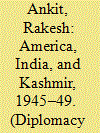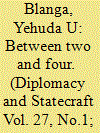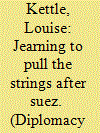|
|
|
Sort Order |
|
|
|
Items / Page
|
|
|
|
|
|
|
| Srl | Item |
| 1 |
ID:
146038


|
|
|
|
|
| Summary/Abstract |
This analysis offers an alternative examination of American interest in India in the mid-1940s and situates the early American attitude to Kashmir into that matrix. The two years from 1945 to 1947, those of the emergence of decolonisation and the Cold War, critically influenced America’s attitude first towards India and then towards Kashmir. It has been commonplace to describe America’s early understanding of the Kashmir conflict as an issue unconnected with the Cold War until 1952–1954. Even those works, which argue for an early presence of an “east-west lens” in the American consciousness, begin from either the Communist triumph in China or the outbreak of the Korean War. This analysis, instead, shows how soon, how much, and how comprehensively various sections of American government looked at Kashmir through an international prism.
|
|
|
|
|
|
|
|
|
|
|
|
|
|
|
|
| 2 |
ID:
146041


|
|
|
|
|
| Summary/Abstract |
This analysis examines one of the unknown chapters in the diplomatic history of the Arab-Israeli conflict: the French initiative of 1969 calling for diplomatic co-operation amongst the four Great Powers—the United States, Soviet Union, Britain, and France—to put an end to the conflict. The “Forum of Four” did not just attempt to mediate and achieve a compromise between Israel and the Arabs; it also presumed to define the general envelope for the agreement and dictate the path that the sides should follow toward a peace agreement. This analaysis examines the diplomatic positions of Israel, Egypt, and their superpower patrons—which conducted a “Forum of Two”—during the first months of the War of Attrition in 1969 and presents the details of the planned agreement worked out in the deliberations amongst the Powers, especially the United States and Soviet Union. It also surveys the reactions to them and the reasons why mediation failed.
|
|
|
|
|
|
|
|
|
|
|
|
|
|
|
|
| 3 |
ID:
146043


|
|
|
|
|
| Summary/Abstract |
This analysis examines the decision-making process of the Barack Obama Administration that led to the American decision in March 2011 to intervene in Libya. Its focus is whether the bureaucratic politics model of foreign policy decision-making can accurately explain the situation. In this case, finding mixed empirical support for the explanatory power of bureaucratic politics, it contributes to the further development of the model for foreign policy decision-making.
|
|
|
|
|
|
|
|
|
|
|
|
|
|
|
|
| 4 |
ID:
146042


|
|
|
|
|
| Summary/Abstract |
In 1971, Senator Edward Kennedy co-sponsored a resolution in Congress calling for the withdrawal of British troops from Northern Ireland. The House of Representatives Sub-Committee on Europe held hearings on this resolution in February 1972 in the immediate aftermath of the deaths in Londonderry of “Bloody Sunday.” These hearings represented the first time that several high profile American political figures had spoken out on the developing conflict in Northern Ireland and, whilst the hearings did not lead to a significant change in American policy towards the conflict, the threat of further ones persisted from the Richard Nixon to the Ronald Reagan administrations. This analysis examines the impact of the 1972 Congressional hearings and the threat posed by the possibility of future ones in the wider context of United States policy towards the Northern Ireland conflict until 1981.
|
|
|
|
|
|
|
|
|
|
|
|
|
|
|
|
| 5 |
ID:
146044


|
|
|
|
|
| Summary/Abstract |
Recently some revisionist historians have contested the evidential basis for the argument put forward by their post-revisionist colleagues that the growth of the German mercantile marine, most particularly ships capable of being transformed into armed commerce raiders, was viewed with alarm in the British Admiralty and played a significant part in shaping British naval policy before 1914. Looking in detail at their reasoning, this assessment demonstrates that the rejection of this argument is based upon a faulty and incomplete understanding of the documentary record. Moreover, it is driven by a desire to defend the thesis that they have previously articulated that the expansion of German maritime power played a limited role in British defence policy before 1914. However, their objections do not withstand detailed scrutiny. Whatever might have been the British view of the long-term threat posed by Russia and France, Germany’s growing strength, including in merchant shipping, loomed large as a security problem in the decade and a half before 1914. The wartime activities of German commerce raiders, notably the Kronprinz Wilhelm, suggest that fears of a German commerce war were entirely rational.
|
|
|
|
|
|
|
|
|
|
|
|
|
|
|
|
| 6 |
ID:
146039


|
|
|
|
|
| Summary/Abstract |
This analysis re-instates the importance of the 1958 British intervention in Jordan within the study of Anglo–American relations and the revisionist literature on Suez. It does so by challenging the idea of British subservience to American foreign policy after the 1956 crisis, and it reveals two key lessons learnt by London: that Britain’s economy, power, and influence were in decline and that Britain could no longer intervene in the Middle East without American support. Having learnt these lessons, Prime Minister Harold Macmillan proved to be a shrewd political actor who used the opportunity of the Jordan intervention to turn the policy of the Dwight Eisenhower Administration to British ends, regaining Britain’s maximum power and prestige for the minimum loss of resources.
|
|
|
|
|
|
|
|
|
|
|
|
|
|
|
|
| 7 |
ID:
146040


|
|
|
|
|
| Summary/Abstract |
President John Kennedy made foreign aid a key component of his Cold War strategy, introducing it with much fanfare in 1961. He increased funding for aid projects and created several agencies aimed at modernising the under-developed world. A year later, aid was under pressure from elements in Congress that doubted both its value and accomplishments. In late 1962, Kennedy commissioned General Lucius Clay to assemble a committee to review the aims and management of America’s foreign aid programme. Reflecting the president’s desire to ensure optimal value and neutralise opponents, it also indicated Administration belief that the rhetoric of modernisation had overshadowed the relationship between aid and national security. Never intending Clay to assemble a mere rubber stamp Committee, Kennedy specifically tasked the members with investigating aid’s role in supporting the “Free World.” The effort failed. Scholars traditionally assume that it did so because Clay opposed Kennedy’s programme; however, he was supportive of the president’s efforts. Instead, its demise came at the hands of an unusual Congressional coalition that enthusiastically cut the president’s budget.
|
|
|
|
|
|
|
|
|
|
|
|
|
|
|
|
| 8 |
ID:
146037


|
|
|
|
|
| Summary/Abstract |
Thucydides’ History remains the basis for numerous claims within International Relations Theory, contributing to defining concepts from the security dilemma to the dynamics of bi-polarity and hegemonic transition theory. But the historical record that underpins Thucydides’ History provides a more complex view of the rivalry between Athens and Sparta. This analysis argues that basing explanations for the Great Peloponnesian War on the premise of Spartan “fear” is incomplete. A bi-polar, hegemonic rivalry did not lock-in the two states; they existed in a complex multi-polar system. This multi-polarity allowed other actors—notably Corinth—to play a key role in the outbreak of war. It was consideration for alliances, empires, and political rivalries within the context of multi-polarity, rather than a prosaic Spartan “fear,” that were at the heart of the war. These unique characteristics combined with the misrepresentation of the historical record, make generalising from the Peloponnesian War dangerous.
|
|
|
|
|
|
|
|
|
|
|
|
|
|
|
|
|
|
|
|
|